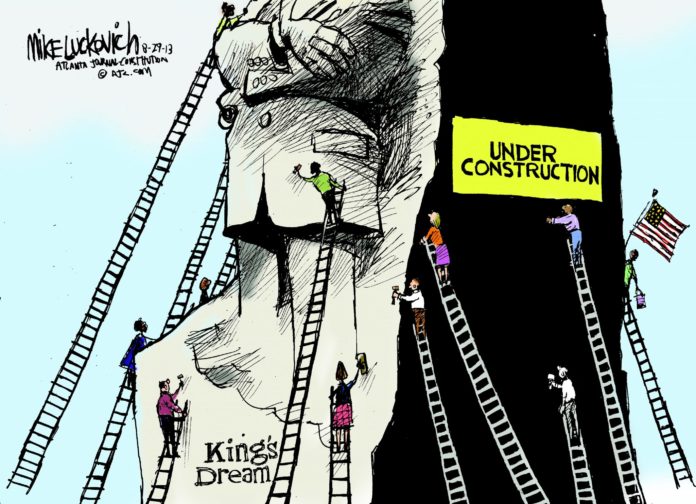BY GENE POLICINSKI
Labor Day weekend is upon us, just a few days this year past the 50th anniversary of the Rev. Martin Luther King Jr.’s famed “I have a Dream” speech.
On Aug. 28, 1963, King’s speech closed out the “March on Washington for Jobs and Freedom.” It set out a historic milepost in civil rights movement. But King and other speakers – including Walter Reuther, long-time president of the United Auto Workers – also called for equal opportunity in employment.
That focus on workers was right in keeping with the First Amendment, the “blue collar worker” part of the Bill of Rights. The nine other amendments set out limits to government powers. But the First Amendment is the means, mechanism and method by which we actively use freedom to participate in self-governance, including the work required to achieve King’s and Reuther’s vision of equality in the voting booth, the workplace and the public square.
King described the goal: “… the Founders promised that all men – yes, black men as well as white men – would be guaranteed the unalienable rights of life, liberty and the pursuit of happiness.”
Clearly, the right of free speech ensured that an entrenched and powerful system of bigotry backed by laws of segregation and the historical customs of separation could not silence its critics. The rights of assembly and petition guaranteed that generations of Americans – civil rights advocates, labor activists, suffragettes and others – cannot not long be dispersed or silenced by government.
The amendment also provided that a free press, while sometimes shamefully slow to do so, ultimately provide a living-room-view of the horrific death spasms of a segregated society. There was no avoiding in the late 1950s and 1960s the nightly TV news views of police dogs and fire hoses loosed on fellow citizens, the magazine articles with indelible images of lynched men, and the newspaper stories and photos of bombed churches and bloody Freedom Riders.
Just 100 years after the Civil War tore at the fabric of the Union, those freedoms provided the path for our nation to take corrective action by a new set of laws to protect voting rights and against discrimination, and to set in motion new attitudes.
Little more than one century after a nationwide controversy was sparked in 1901 when President Theodore Roosevelt invited noted African American educator Booker T. Washington to dinner at the White House, the nation saw the election in 2008 of an African American president, Barack Obama.
President Obama – standing 50 years later to the day on the same Lincoln Memorial steps from which King addressed the march – decried that unemployment for minorities is twice that of whites. Speakers at other National Mall events commemorating the March expanded the call for equality to all minorities, to gays and to immigrants. Critics also assailed the U.S. Supreme Court decision earlier this year to ending what many see as the essential voter protections of the Voting Rights Act of 1965.
Today’s battles over major issues of our day – as in King’s time, including equal rights and jobs – are both fueled by First Amendment freedoms and tempered by the “safety valve” aspect of those same rights. We have thus far used those freedoms to avoid the great fear of the Founders, the “tyranny of the majority” that could freeze policies and programs in place.
Panelists in a July 29 program at the Newseum in Washington, DC, theorized that King’s closing words echo so strongly down the halls of our history because he spoke both to the issues and aspiration in great American experience of self-governance and self-reliance rooted in five basic freedoms of the First Amendment: religion, speech, press, assembly and petition.
“When we allow freedom to ring, when we let it ring from every city and every hamlet, from every state and every city, we will be able to speed up that day when all of God’s children, black men and white men, Jews and Gentiles, Protestants and Catholics, will be able to join hands and sing in the words of the old Negro spiritual, ‘Free at last, Free at last, Great God almighty, We are free at last.’”
– Gene Policinski is chief operating office of the Newseum Institute and senior vice president of its First Amendment Center. You can e-mail him at gpolicinski@newseum.org.








